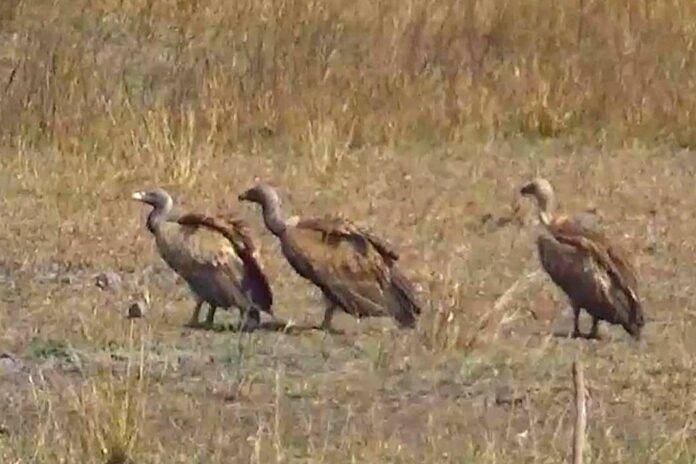Vultures at Bandhavgarh National Park, India. (Gyps indicus and Gyps bengalensis)
Vultures play a very important role in ecosystem management. Primarily feeding on carrion, they are very efficient scavengers and help to keep the environment clean. They play a very important role in promoting the nutrient cycle by accelerating decomposition and releasing nutrients back in to the soil. With a population of more than 40 million in the early 1990’s the population has declined to less than 0.1 million which is a catastrophic drop of almost 99.9% with related severe consequences. Vultures also help in restraining the population growth of other opportunistic scavengers like rats and feral dogs which have reverted back to a wild stage and have become wild without fear of humans. They are a reservoir of disease and danger to man and animals.
The drastic reduction in population of vultures over a short period has been attributed to the use of the drug ‘Diclofenac’ which is used to treat live stock. Residual diclofenac in carcasses is toxic to vultures which die of kidney failure. Diclofenac use for veterinary purposes has been banned in India since March 2006. It is also banned in Nepal, Bangladesh and Pakistan. Vulture conservation in India is a priority with the MoEF and CC executing a Vulture Action Plan from 2020-2025.
This flock of vultures was observed inside the Bandhavgarh National Park in the Khitauli Zone. A recent census has revealed about 343 birds inside the park represented by the Indian Vulture, White Rumped Vulture, the Egyptian Vulture and the Red Headed Vulture.
This flock, from the distance afforded, appears consist of the Indian Vulture and the White Rumped Vulture.
Three of the four species of vultures in Bandhavgarh, the White Rumped Vulture, Indian Vulture or the Long Billed Vulture and the Red-headed Vulture have been identified to be having a high risk of global extinction and are listed as critically endangered in the IUCN List.
©Srimaa Communication
Acknowledgements-Dr. Yashpal Singh, Mrs. Neena Singh, Manoj Kumar Yadav
